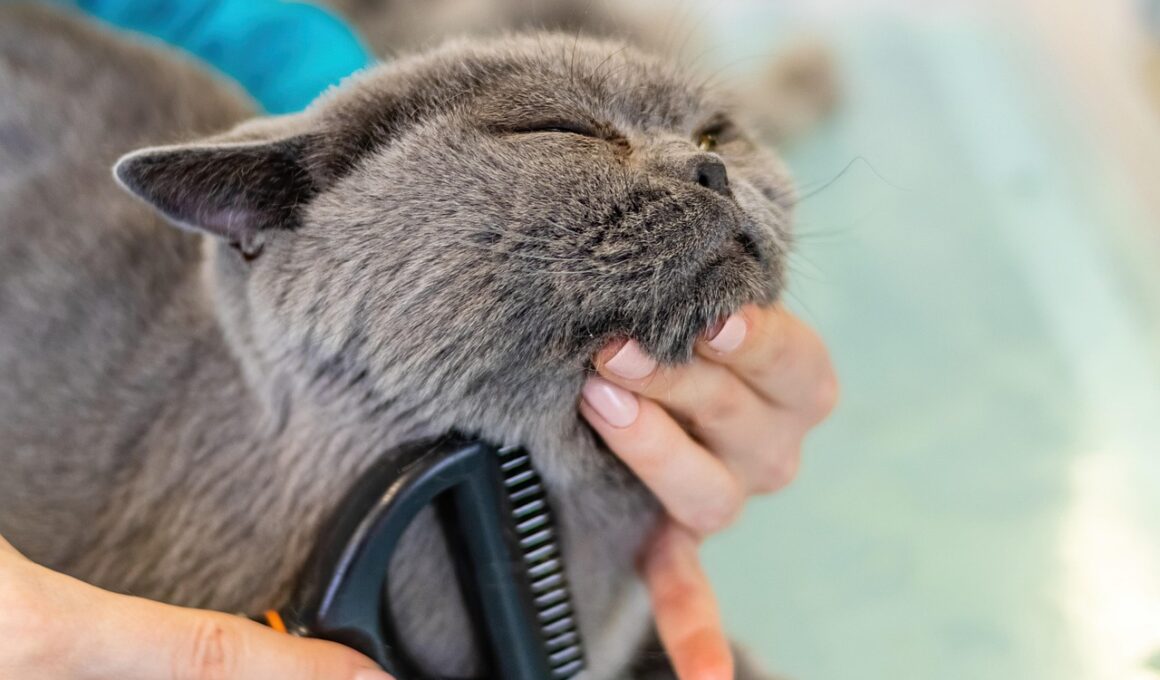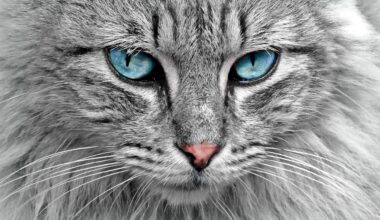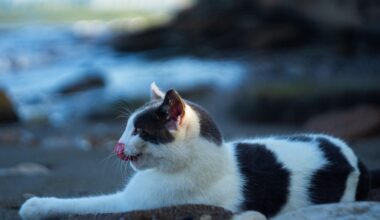The Role of Diet in Maintaining a Healthy Coat for Senior Cats
As cats age, their dietary needs evolve significantly. A well-balanced diet is essential for senior cats, especially to maintain a healthy coat. Not only does nutrition influence their overall health, but it also affects the condition of their fur. For senior cats, protein is crucial, aiding in coat regeneration and strength. Essential fatty acids, particularly Omega-3 and Omega-6, work wonders in keeping the skin moisturized and the coat shiny. Vitamins such as E and A are also vital. They help promote skin health and promote a vibrant coat. Cats tend to lose their downtown coat quality due to age-related changes. Including high-quality protein sources, like fish and chicken, ensures they receive the necessary amino acids. Furthermore, adding omega-rich supplements or foods can combat dryness. Regular grooming also plays an indispensable role, removing loose fur and stimulating blood flow to the skin. Always consult a veterinarian before making significant dietary adjustments to ensure they meet your senior cat’s unique needs. In essence, combining a nutritionally rich diet with proper grooming can significantly enhance the quality of your senior cat’s coat.
In addition to incorporating high-quality proteins and fatty acids in their diet, senior cats may also benefit from a more tailored feeding schedule. With age, their metabolism slows down, which can lead to weight gain if food is not monitored closely. Feeding smaller portions more frequently helps distribute energy throughout the day while making digestion easier. Fiber content is equally significant, aiding in digestive health and preventing hairballs that can lead to coat issues. Look for cat foods specifically formulated for seniors, as they often contain the right balance of nutrients for older cats. Including wet food options can increase hydration, thereby supporting skin health. Senior cats are also more prone to dehydration, contributing to coat problems; hence, ensure fresh water is available at all times. Additionally, some cats may develop food sensitivities as they age. Observe your pet for any signs of allergies, such as itching or skin irritations. Keeping a balanced, nutritious diet while being mindful of any changes helps maintain both their coat health and their overall well-being.
Hydration’s Importance in Coat Health
Hydration is another critical factor in maintaining a senior cat’s coat health. Cats, especially older ones, have a tendency to drink less water, which can lead to dehydration. Dehydration significantly impacts coat quality and skin health, resulting in dry, brittle hair. Encouraging your senior cat to drink more water can greatly improve their overall appearance. Providing a cat water fountain can be particularly beneficial, as many cats prefer running water. This encourages them to drink more frequently and helps keep their skin and coat well-hydrated. Additionally, moist foods can also contribute to overall hydration. Cats consuming wet food get essential moisture in their diet. Monitor your cat’s water intake, especially during warmer months. Along with water, consider incorporating broth or adding water to their dry food to increase moisture. Make sure any additional food or broth is free from harmful ingredients. Understanding that hydration plays a vital role in coat health will help you provide the best care for your senior feline friend. A well hydrated cat often reflects a shiny, beautiful coat, showcasing their happiness and well-being.
Regular grooming complements a nutritious diet in promoting a healthy coat for senior cats. While a good diet supports skin and fur health from the inside, external grooming improves circulation and helps remove dead hair. Brushing your senior cat regularly encourages the distribution of natural oils, which adds shine to their coat. When grooming, consider the type of coat your cat has; long-haired breeds may require more frequent brushing compared to short-haired cats. Products like cat-friendly brushes can help prevent matting and reduce shedding, further promoting a healthy look. Additionally, regular grooming sessions provide an opportunity for you to check the skin for any abnormalities. Look for unusual bumps, redness, or signs of discomfort, which may indicate health issues that require veterinary attention. Ensuring an enjoyable grooming experience enhances your bond with your senior cat while contributing significantly to coat maintenance. Reward your cat after grooming sessions to create a positive association. Cultivating a routine allows both you and your cat to reap the benefits of grooming, facilitating smoother sessions that contribute to overall coat health.
Understanding Nutritional Deficiencies
Nutritional deficiencies are significant contributors to poor coat health in senior cats. As cats age, their bodies may not absorb nutrients as efficaciously as they once did, leading to imbalances. Identifying deficiencies can be quite challenging, but understanding common indicators is essential. Dull, brittle fur often signals that your cat isn’t receiving the right nutrients. Issues like excessive shedding or skin flakiness can point to fatty acid or protein deficiencies. Transitioning your cat to a senior-specific diet may help mitigate these concerns, as these formulas are tailored to meet the nutritional needs of older felines. Supplements can also bridge nutritional gaps, but always consult your veterinarian before introducing new products. Regular check-ups allow a vet to monitor your cat’s weight and overall health, providing essential data for dietary adjustments. Ensure you’re watching for any changes that could suggest dietary issues or health problems. Taking these proactive steps can help avert potential coat deterioration, ensuring your senior cat maintains a healthy and vibrant appearance.
When considering the overall health of senior cats, it is vital to remember the impact of obesity on coat quality. Excess weight can significantly affect a cat’s mobility and overall health, subsequently influencing coat condition. An overweight cat may be less inclined to groom itself adequately, causing matting and dirty fur. This highlights the importance of balancing caloric intake with activity levels. Encouraging play is crucial, as it helps seniors maintain a healthy weight while providing physical stimulation. Simple toys, like feather wands or laser pointers, engage them in gentle yet effective exercise. Providing a well-structured routine allows your cat to find stimulation and enjoyment, which positively affects their mood and well-being. Understanding each cat’s unique dietary needs prevents excess weight gain, which, in turn, supports a healthier coat. Regular weigh-ins with your veterinarian can help manage their weight effectively, leading to overall better health. Prevention and awareness about weight management are key to supporting coat health and overall well-being as they age.
Final Thoughts on Senior Cat Grooming
In conclusion, maintaining a healthy coat for senior cats revolves around proper diet, hydration, grooming, and awareness of potential health issues. Always prioritize a balanced, age-appropriate diet rich in high-quality proteins, essential fatty acids, and vitamins. Monitoring hydration levels is crucial for skin and coat care. Regular grooming sessions promote a healthy coat by enhancing circulation while removing dead hair. Pay attention to your cat’s unique dietary and grooming needs as they age, ensuring they receive adequate nutrition and health monitoring. Remain observant for any changes in grooming habits, coat appearance, signifying potential deficiencies or health issues. Additionally, incorporating playtime into your routine can prevent obesity, contributing further to coat health. Investing time in understanding these various aspects ensures your senior cat remains healthy and vibrant throughout their golden years. A comfortable, joyful life for your feline companion becomes achievable with these dedicated efforts towards their care. By taking these steps and being proactive in maintaining a routine, you’re providing them the attention they deserve, reflecting in a stunning and well-kept coat.


